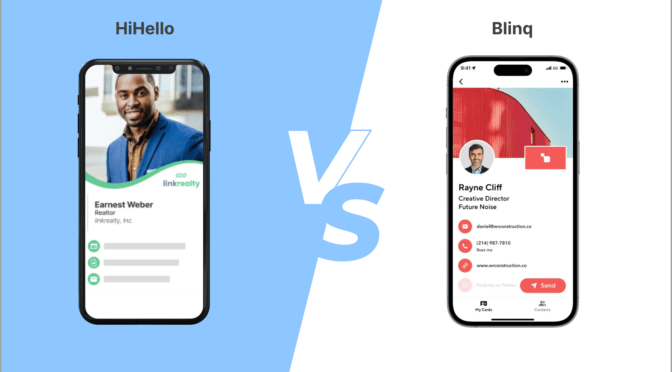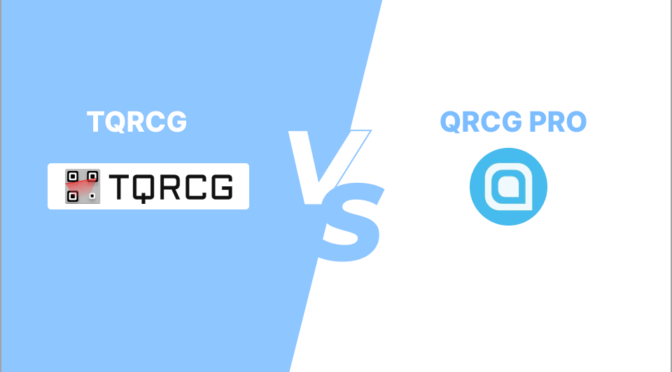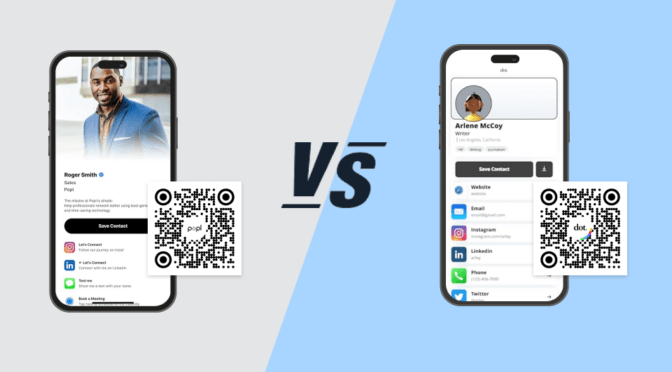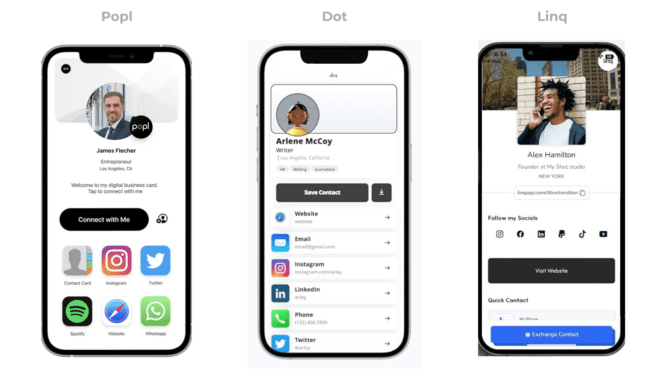We make the “app vs. app” comparisons to help you choose between two or more similar options. Sometimes, the mix includes Uniqode as an option. However, our goal remains the same: to give you hands-on, practical takeaways so you can make an informed decision. Here’s how we make app (product or solution) comparisons at Uniqode.
How do we compare apps
We do three types of comparisons, primarily:
- Uniqode vs. third-party
- Third-party vs. third-party
- Listicles
Uniqode vs. third-party involves putting our offering against a similar option from another brand. For QR Codes, for example, we may compare Uniqode’s QR Code generator with Canva’s or Adobe’s.
Third-party vs. third-party compares two or more third-party products against each other, such as Dot vs. Popl. vs. Linq—all offering similar solutions. In such comparisons, we do not focus on Uniqode, even though we may offer the same or better product; if our product adds value to achieving a task, we mention it in passing as something you can try. The sole aim of such comparisons remains to empower you to make informed choices between many options.
| 😊 Just so you know: We actively look for new and updated products in our category, including what people and leading publications discuss on various channels—so you can choose from the best. |
Sometimes, we also compare specific features within a more extensive product. For QR Codes, for example, we have comparison posts on the free vs. paid QR Code generators and the best QR Code generator with tracking capabilities. The same applies to our other products and their specific features.
In listicles, we try to give a bird’s-eye view of the best products or solutions you can choose from. Listicles may include Uniqode or completely focus on third-party. For example, we might list the best links in bio tools.
Irrespective of our comparisons, all the styles have two things in common:
- We provide an “at a glance” table in every post highlighting every feature side-by-side before starting the comparison or reviewing the candidates in a listicle
- Every candidate in a listicle has a clear section highlighting their strong suits based on real-life usage
Our research methodology (editorial policy)
We put ourselves in your shoes! We start by researching which features you may need to achieve your goals. Then, we get hands-on, manually testing each product to see how it stacks up (unless otherwise explicitly mentioned).
If we manually test an app, we don’t rely on specs here—we take note of our experience, cross-verify features that didn’t work, and refer to our internal data (if it includes Uniqode) to give you the whole picture.
If we mention that Uniqode was not involved in manually testing the tools, it means the information you see is derived from research of the app’s publicly available details (websites, landing pages, pricing pages, existing third-party reviews, etc.) and reviews (G2, Capterra, Trustpilot, third-party reviews, etc.).
Finally, we review everything to ensure a clear and unbiased comparison.
🔎 Identifying features in focus
Every comparison focuses on a different set of features that we declare at the start of the post. For example, in a listicle on the best enterprise QR Code generators, we will focus on enterprise-first needs: bulk QR Code generation, centralized management, admin capabilities, customizations, integrations with third-party apps, data security, customer support, and pricing.
Having a set of features to focus on helps us prioritize what you need to achieve your goals and objectively analyze them in a particular post. We always declare the features in focus before starting the comparison—so you know what to look for based on your unique needs.
👁️ Auditing the product
We start by auditing the product website, checking its landing pages, solutions, case studies, pricing, blogs, etc.
💻 Hands-on testing
We begin the actual testing with a free trial or a demo. We start playing around with the product dashboard and features.
When comparing a product’s specific capability, we may focus on that particular pain point during our review. For example, we may compare the customization options between QR Code generators. Or put two digital business card solutions against each other for their team management capabilities.
✍️ Talking notes
We take notes based on the pre-set features we set for the comparison. For instance, if a post focuses on creating QR Codes in bulk for mid-sized businesses, we’ll go through the entire process (which differs for each product) and note down:
- How quickly can you sign up, log in to begin the work
- How easy is navigating the UI and customizing the QR Code
- What features are there regarding bulk creation
- How straightforward it is to upload the data for bulk QR Codes
- How to upload QR Code data on the dashboard
- How fast can you download the QR Codes in bulk
- What are the pricing plans available
In rare cases, we take a demo if some features are behind a paywall in a free trial. If that is unavailable, we do hours of research on third-party review platforms focusing on the premium features to understand people’s or businesses’ experience using them. We instantly attribute the source if we highlight any third-party review in the comparison post.
🔀 Cross-verifying
If we encounter difficulty while testing, we cross-verify it on review platforms such as G2, Product Hunt, Capterra, etc. If time permits, we contact the required support team for answers.
We try to understand if others face the same issue while using a product or if it is just us—which could be an anomaly or bug.
At this stage, we note people’s experiences using the platform and the features they found helpful or not so much. We may highlight them in the final print. We add screenshots to the post as references for features that work flawlessly or match the product’s landing page claims.
📊 Referring to our internal data
If we compare Uniqode with third-party products, we utilize our internal data to understand what features our users unanimously found helpful and other unique customer inputs.
Sometimes, our users explicitly state something they found helpful in a third-party solution but is absent on Uniqode, and vice versa. If the third-party candidate offers something we don’t, we highlight that in the comparison post, and vice versa.
All the steps mentioned above take hours to complete. The first draft takes another week or so. Finally, we push the draft to peer and editorial review for quality assurance and fact-checking.
🤵 Review (peer and editorial)
We aim to give you an objective overview of any product and let you decide. To address unintentional biases in the content, we keep our editorial review independent of other Uniqode stakeholders’ inputs during the writing and reviewing process.
Every comparison draft comes to the editors as a fresh piece of content sans prior intimation. This process helps us maintain objectivity while reviewing. Editors focus solely on helping you achieve your goals from an unbiased perspective—with or without Uniqode in the picture.
If we add a disclaimer, claim, opinion, or pointer referring to a third party, we attribute it using hyperlinks, videos, screenshots, and infographics. If something is missing, we fetch it—all these to empower you to make the choice.
We strictly avoid pitching our product where we believe it doesn’t help you. We actively identify and quash content that might subtly hint at a biased point of view. If you find something that violates the editorial standards mentioned above, please bring it to our attention at: hello@uniqode.com with the subject line: Editorial query
Frequently asked questions
Does Uniqode earn a commission from featuring products in listicles?
Uniqode does not benefit financially from the products in listicles. Every app in a listicle is selected based on merit, competence, and product value. If the listicle features Unqiode, we mention any shortcomings our products may have compared to the other candidates.
Are Uniqode’s third-party comparison posts sponsored?
No, the Uniqode blog does not accept sponsored content for comparison posts or any other type. Every piece of content live on the blog results from thousands of human working hours, written and reviewed by professionals who spent most of their careers working closely with software products.
Why is there no comparison with my product?
We follow a strict user-centric approach to decide which product or solution to compare. It means that solutions that people are talking about or widely using often enter our editorial calendar.
Some solutions may not make it through our interim research because they have fewer features, an inadequate MVP example, or a poor user experience. Sometimes, an app may be good but lacks solid data security, which we prioritize for our enterprise customers.
It is also possible that your product went under our radar (🥹 we’re actual humans doing the heavy lifting). Please tell us through this form if you think your product matches our offering, and users should know.
Does Uniqode prioritize apps their team members or partners suggest or prefer?
No. We don’t prioritize apps that Uniqode team members use, prefer, or are affiliated with in any way. Every comparison is made with candidates who genuinely compete with our product or a third party that users can consider to get their job done.
Ektha is a QR code expert with years of research and analysis into the evolution of QR codes. Having written over 70 in-depth articles on QR technology, she has developed a comprehensive understanding of how QR codes are transforming industries. Her insights, including The State of QR Report, have been featured in leading publications. With a passion for simplifying complex topics and providing actionable strategies, Ektha helps businesses leverage QR codes to enhance their ‘phygital’ connections.















